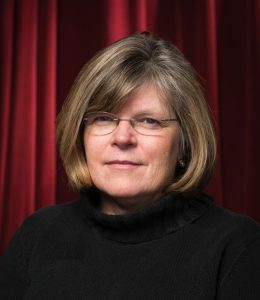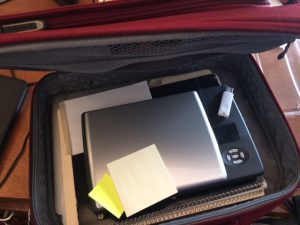 Shortly after I began work at NEHGS about ten years ago, we went into all-hands-on-deck mode. The occasion was the National Genealogical Society’s annual conference, which was in Boston that year and bringing many visitors to the building. A newbie, I was assigned the non-genealogical task of welcoming people at the door. The first person arrived, pulling a wheelie bag behind her. “Hello!” I said. “May I store your bag?” Everyone froze. A hushed silence fell. Finally someone clued me in: “Penny. That’s her research!” Oh.
Shortly after I began work at NEHGS about ten years ago, we went into all-hands-on-deck mode. The occasion was the National Genealogical Society’s annual conference, which was in Boston that year and bringing many visitors to the building. A newbie, I was assigned the non-genealogical task of welcoming people at the door. The first person arrived, pulling a wheelie bag behind her. “Hello!” I said. “May I store your bag?” Everyone froze. A hushed silence fell. Finally someone clued me in: “Penny. That’s her research!” Oh.
 Now I have a wheelie bag of my own. Actually, mine is not wheeled but has a wide shoulder strap. Now that I am semi-retired, I have had time to refine the list of items I carry in the bag for a day of research. Beyond my laptop and power cord, they include the following:
Now I have a wheelie bag of my own. Actually, mine is not wheeled but has a wide shoulder strap. Now that I am semi-retired, I have had time to refine the list of items I carry in the bag for a day of research. Beyond my laptop and power cord, they include the following:
- Pencil with eraser. Ideally, this will be a no. 2 pencil, and a mechanical one, as I am fussy about pencil sharpness. Not only do most libraries prefer for you to use pencils rather than pens, but pencil writing is easy to erase if I make a mistake.
- Thumb drive, for sharing files or downloading a document or image from another source.
- Even though I take notes on my laptop, the physical act of writing with a pencil often helps me remember things. I prefer a spiral-bound notebook and paper with perforated pages so that I can remove pages and put them in a relevant file folder. I also like notebooks with pockets, where I can keep relevant loose pages that come my way.
- Small note pad, for keeping a running to-do list separate from my research notebook. Sheets from this pad also serve as temporary bookmarks.
- Post-It notes of various sizes, for flagging pages within my own research files.
- File folders. I bring (limited) files of work in process, but also a blank folder for new topics undertaken or people discovered.
- Blank family group sheets and multigenerational charts.
- Cell phone and/or scanner. Often I use my phone to take a photo of a page or pages during research. I do own a portable scanner, a Flip-Pal, which I sometimes pack if I want to scan images.
In addition, I’ve developed other habits for research days:
- Wear layers. If the library is overly air conditioned, I wear a sweater. If it’s too hot, I remove the sweater.
- Wear dark clothing. I am known to wear the food I am eating and also the ink or pencil I am writing with. Dark clothing hides stray pencil marks.
- Bring small bills and change to pay for photocopies, as necessary—or to raid the snack machine!
As I write this, I’m thinking of the last time I took my bag to NEHGS.
It was kind of heavy.
Maybe I need one with wheels.
Share this:
About Penny Stratton
A veteran of the book publishing industry, Penny Stratton retired as NEHGS Publishing Director in June 2016; she continues to consult with the Society on publications projects. Among the more than 65 titles she managed at NEHGS are The Great Migration Directory, Elements of Genealogical Analysis, Genealogist’s Handbook for New England Research, and the award-winning Descendants of Judge John Lowell of Newburyport, Massachusetts. She has written for American Ancestors magazine and is a regular poster on Vita Brevis. With Henry B. Hoff, Penny is coauthor of Guide to Genealogical Writing: How to Write and Publish Your Family History; she is also the author of several Portable Genealogists on writing and publishing topics.View all posts by Penny Stratton →